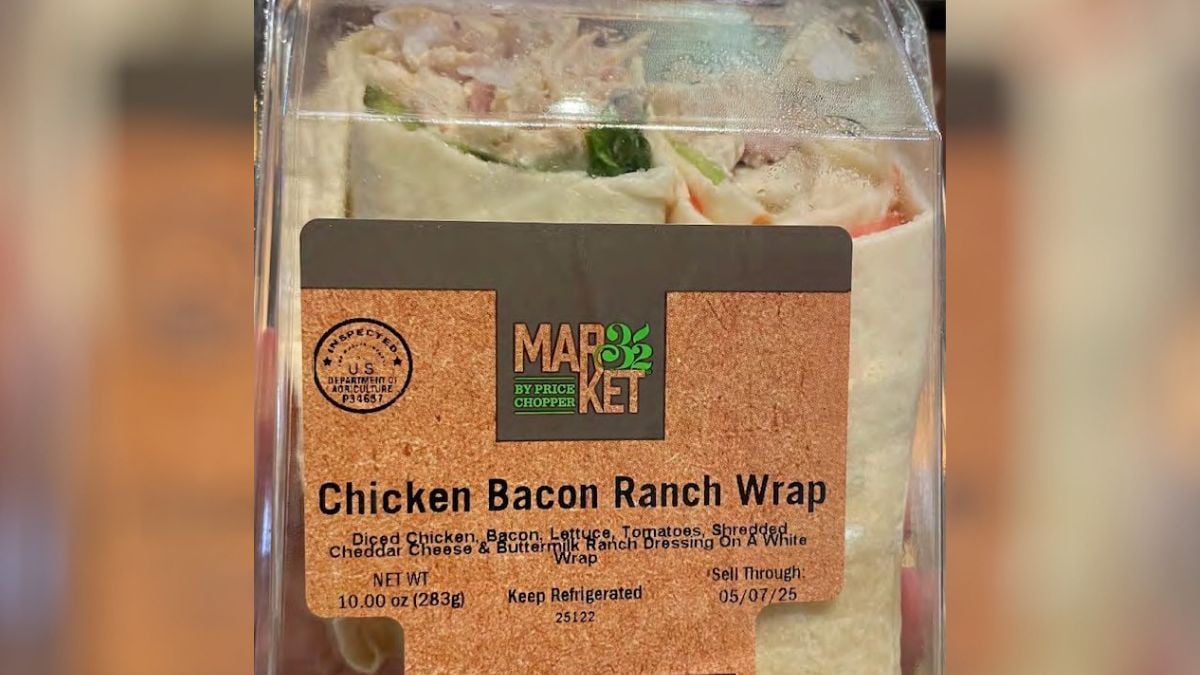
The United States Department of Agriculture (USDA) has issued a public health alert for certain ready-to-eat chicken products that may pose a potential risk of death to consumers. These chicken products were sold in several states across the country; if you recently purchased one of these items, here’s what they are and what you should do about it.
Why was a public health alert issued for chicken?
According to the Food Safety and Inspection Service (FSIS) of the USDA, these chicken products may be contaminated with Listeria monocytogenes, a bacterium that can cause severe health issues and, in serious cases, death.
ALSO READ Chuck E. Cheese is giving away free ice cream TODAY! Here’s how to get yours
Which chicken product is contaminated with Listeria?
The affected chicken was produced on May 2, 2025, has a sell-by date of May 7, 2025, and bears the lot number 25122. It was sold in the following packaging:
- 10 oz plastic packages labeled “Big Y quick easy meals Chicken Bacon Ranch Wrap.”
- 10 oz plastic packages labeled “Market 32 by Price Chicken Bacon Ranch Wrap.”
Where was the contaminated chicken sold?
The affected chicken was distributed and sold at retail establishments in the following states:
- Connecticut (Sold)
- Massachusetts (Distributed and sold)
- New York (Distributed and sold)
What should I do if I purchased the contaminated chicken?
Health authorities advise consumers not to eat this product and to discard it immediately. In addition, anyone who has handled these potentially contaminated products should thoroughly clean and disinfect any surfaces or containers they came into contact with, as Listeria can survive refrigeration and easily spread to other foods and surfaces.
What is the USDA?
The United States Department of Agriculture (USDA) manages programs and services related to rural development, animal welfare, food, nutrition, natural resources, the environment, and forests.
Within the USDA, the Food Safety and Inspection Service (FSIS) serves as its public health agency, with the mission of protecting the public by ensuring that meat, poultry, and egg products are safe for consumption. FSIS carries out this work based on its legal authority under the Federal Meat Inspection Act, the Poultry Products Inspection Act, and the Egg Products Inspection Act. It also enforces the Humane Methods of Slaughter Act, which ensures the humane treatment of animals intended for slaughter.
What is listeria?
Listeria monocytogenes is a bacterium responsible for an infection that can be very serious or even fatal. This condition particularly affects young children, the elderly, pregnant women, and those with weakened immune systems.
Symptoms of listeria
Listeria infection may include the following symptoms, typically appearing within a month:
- Fever
- Muscle aches
- Fatigue
- Headache
- Stiff neck
- Loss of balance
- Seizures
- Confusion
In pregnant women, it can lead to miscarriages or stillbirth.
How dangerous is listeria?
Listeria infection can affect various organs, including the brain, spinal cord membranes, and the circulatory system.
How is listeria transmitted?
The bacterium are widespread in the environment, present in both water and soil. Infected animals can also act as carriers and sources of transmission.
Listeria can be transmitted in the following ways:
- Consumption of unpasteurized milk or contaminated vegetables.
- Transmission from mother to fetus in the womb or directly to the fetus during childbirth.
- Through sexual contact.
- Through inhalation of the organism.
What foods cause listeria?
- Dairy products made with unpasteurized milk
- Ready-to-eat deli meats and processed meats (sausages, hams, and pâtés)
- Smoked fish, such as salmon
How to prevent listeria?
Since this microorganism is widespread in the environment, the most effective protection is to follow basic hygiene practices. This includes consuming only pasteurized dairy products, ensuring meats are well cooked, and properly washing hands before preparing food.
It is also recommended that pregnant women and individuals with weakened immune systems avoid consuming these foods, along with soft cheeses and raw deli meats.








